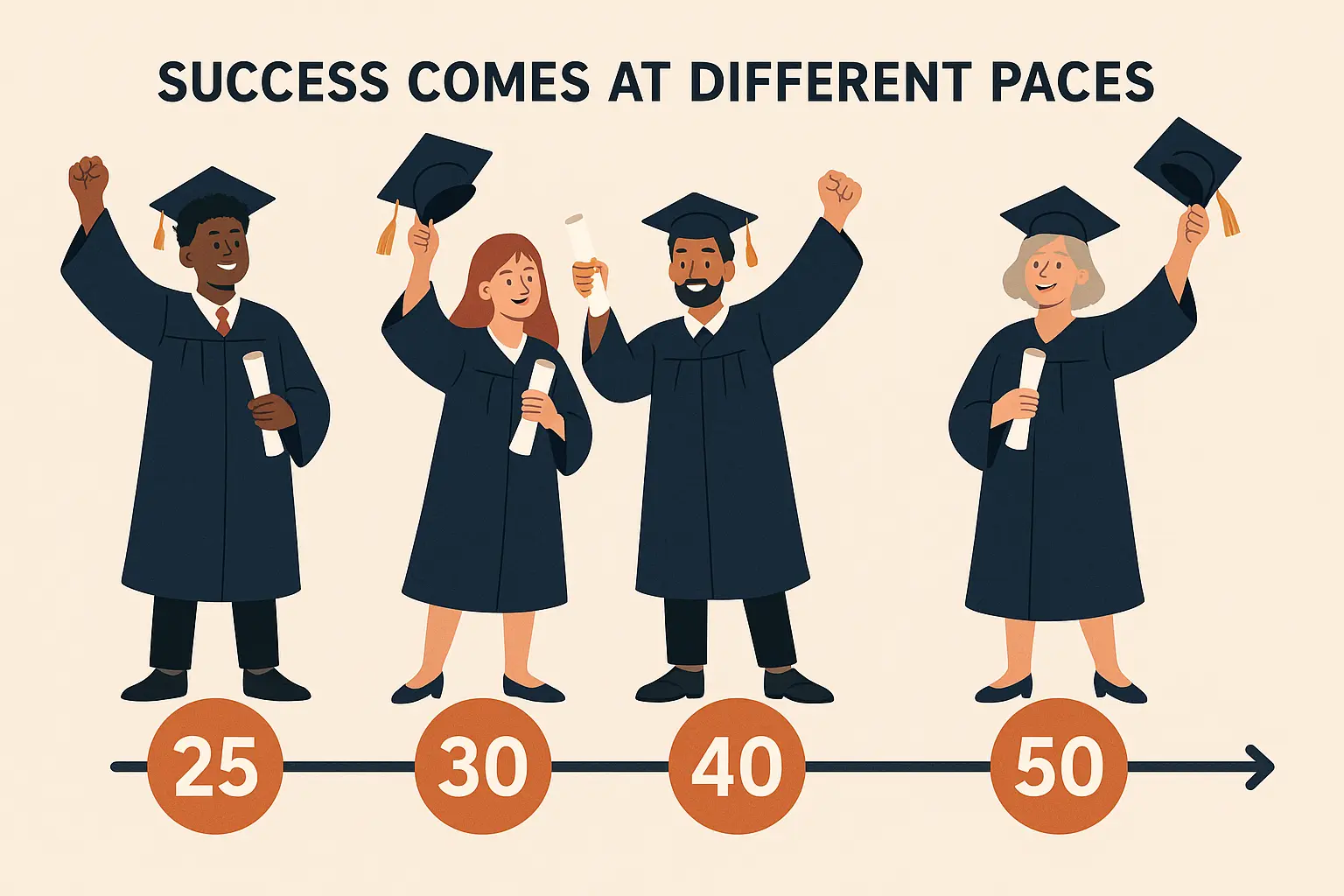Sarah thought she had it all figured out. She’d transferred 45 credits from community college, mapped out her courses, and was ready to knock out her BCom degree in two years flat.
Fast forward 18 months later, and she’s sitting in her advisor’s office learning she needs an extra semester because her “Introduction to Business” class didn’t count toward her required management course. Sound familiar?
Here’s something that might surprise you – according to the National Center for Education Statistics, only 44% of first-time bachelor’s degree recipients actually finished their degree in 48 months or less after first enrolling in college. This means all those “4-year degree” promises you see? They’re mostly marketing.
Table of Contents
-
When “Standard” Timelines Don’t Apply to Your BCom Journey
-
The Institutional Curveballs That Add Unexpected Semesters
-
Your Personal Timeline Equation: Why Everyone’s Different
-
Money Matters: How Finances Shape Your Graduation Date
-
Final Thoughts
What You Really Need to Know
Look, I’m going to save you some time here. The “4-year degree” thing? It’s mostly marketing. Here’s what actually happens:
-
Your transfer credits probably won’t line up the way you think they will
-
Miss one prerequisite class and you’re looking at an extra year
-
Some classes are only offered once a year (surprise!)
-
Working while studying changes everything about your timeline
-
Money stress will mess with your plans whether you like it or not
-
Schools change their requirements and sometimes you get stuck with extra coursework
When “Standard” Timelines Don’t Apply to Your BCom Journey
The 3-4 year BCom timeline you see everywhere? It’s about as realistic as those stock photos of students laughing at salads. Real completion times depend on a bunch of stuff nobody warns you about – credit transfer nightmares, prerequisite chains that make no sense, and academic momentum factors that can derail your plans faster than you can say “business ethics.”
I’ve watched countless students get blindsided by factors they never saw coming. The reality is that how long it takes to get a business degree depends on way more than how smart you are or how motivated you feel.
Understanding the real timeline factors becomes even more critical when you consider that business degree completion involves multiple variables that extend beyond traditional academic planning.
The continued popularity of BCom programs shows their value despite all these completion challenges. Recent reports from “Indian colleges” show BCom remains the most sought-after degree, with institutions getting over 1,200 applications for BCom programs. Students keep applying despite knowing the timeline can be unpredictable.
The Credit Transfer Reality Check
Here’s the brutal truth about transfer credits: Your general education classes will probably transfer fine, but the business courses you really need? Maybe half will count. And that foreign language requirement you knocked out at community college? Might be completely useless for your BCom.
Transfer credits create more headaches than solutions for most BCom students. Even when you think you’re ahead of the game, credit misalignments can force you into additional semesters you never planned for. The problem isn’t how many credits you have – it’s where those credits actually fit in your degree plan.
When I talk to transfer students, they’re often shocked to discover that how long a business degree takes extends way beyond their initial calculations. It’s like trying to fit puzzle pieces from different boxes together.
|
Credit Type |
Typical Transfer Rate |
BCom Core Alignment |
Timeline Impact |
|---|---|---|---|
|
General Education |
80-90% |
Low (30-40%) |
+1 semester |
|
Business Electives |
60-70% |
Medium (50-60%) |
+0.5 semester |
|
Core Business |
40-50% |
High (70-80%) |
-0.5 semester |
|
Math/Statistics |
70-80% |
High (80-90%) |
Neutral |
|
Foreign Language |
90-95% |
Low (20-30%) |
+1 semester |
Why Your Previous Credits Might Not Count Where It Matters
Universities evaluate transfer credits in ways that’ll make your head spin. A course that seems totally relevant might not fulfill specific BCom core requirements, creating what I call “useless credits” – they count toward your total but don’t actually help you graduate.
Many students discover their previous coursework doesn’t transfer as expected, which is why understanding associate degree timelines and credit transfer issues becomes crucial for realistic BCom planning.
Here’s what you need to do right now:
-
Before you commit to any school, make them show you exactly how your credits will transfer – don’t take “probably” for an answer
-
Get that credit evaluation in writing and map it against specific BCom requirements
-
Find out which of your credits are basically worthless for your actual degree
Let me tell you about Sarah’s situation. She transferred 45 credits from her associate degree, expecting to finish her BCom in two years. But her “Introduction to Business” course didn’t count toward the required “Principles of Management” core class because it was missing specific management theory components. This single credit mismatch forced her into an additional semester, turning her 2-year plan into 2.5 years.
When Missing One Class Screws Up Your Whole Plan
Missing a single prerequisite creates a domino effect that can add an entire year to your BCom timeline. Critical classes can’t be delayed, and backup options aren’t always available when you need them.
I’ve seen students miss graduation by a full year because they didn’t take Statistics in their sophomore year. When you’re wondering how long it takes to get a business degree, you need to think about these course sequences from day one. Miss one prerequisite, and you’re looking at how long it takes to get a business degree plus an extra year.
Do this immediately:
-
Make a flowchart of your entire degree program showing which classes you need before others
-
Figure out which courses are absolutely critical and can’t be delayed
-
Have backup plans for different scenarios
Things you need to figure out right now:
-
☐ Did you take the right math class first? (This trips up everyone)
-
☐ Do you know which accounting classes come in what order?
-
☐ Have you checked if that statistics class has prerequisites?
-
☐ What economics classes do you actually need?
-
☐ Are there any finance classes that build on each other?
-
☐ Which marketing courses can you take in any order?
-
☐ What’s the management course sequence look like?
How Your Brain Handles Academic Pressure
The relationship between how hard your courses are, how much you can handle, and how long everything takes has a huge impact on your BCom timeline. Keeping your study groove going affects part-time students differently, and certain specializations create bottlenecks that force longer timelines no matter how smart you are.
Research from Columbia Southern University shows that students who completed 30 or more credits in their first year had a 72.3% chance of earning their bachelor’s degree in four years or less, compared to only 30.1% for students who completed 0-23 credits in their first year.
The question of how long to get a business degree becomes really personal when you factor in your individual learning capacity and what’s going on in your life.
Why Part-Time Students Get Hit With Unexpected Delays
Part-time BCom students often take way longer than their calculated timeline because it’s harder to keep your study momentum going when you’re juggling work and school. The mental switch between work mode and study mode creates inefficiencies that full-time students don’t deal with.
Part-time students face unique challenges, and understanding general degree completion factors helps in planning realistic BCom timelines that actually work with your life.
Your game plan should include:
-
Figure out your optimal credit load based on your actual life, not just what you can afford
-
Find out which courses are only offered certain semesters so you don’t get stuck
-
Look into intensive summer programs to keep your momentum going
Specialization Bottlenecks Nobody Warns You About
Certain BCom specializations have limited course offerings that force students into longer timelines. Popular paths like finance or marketing often have capacity constraints that delay graduation no matter how well you’re doing in school.
This is where the question of how long it takes to get a business degree gets really complicated. Your specialization choice directly impacts your timeline, and some paths just take longer. How long does it take to get a business degree in finance? Often longer than general business because there aren’t as many advanced finance courses offered.
You need to:
-
Research how often courses in your specialization are actually offered
-
Have backup specialization options that share some of the same requirements
-
Consider double majors or minors that use overlapping courses
Here’s what happened to Michael: He planned to specialize in International Business but found out the required “Global Supply Chain Management” course was only offered once per year with limited seats. When he couldn’t register because the class was full, his graduation got pushed back a full year. He ended up switching to General Business just to graduate on time.
The Institutional Curveballs That Add Unexpected Semesters
Universities have their own operational realities that can mess with your BCom timeline without any warning. Budget cuts affect which courses they offer, accreditation changes require additional coursework, and when professors leave, entire courses can just disappear from the schedule. These institutional factors are completely out of your control but can seriously impact when you graduate.
When Course Availability Becomes Your Biggest Problem
Limited seats in required BCom courses can force delays that have nothing to do with your academic planning or how well you’re doing in school. The registration system often rewards luck more than merit.
I’ve watched students with perfect GPAs get shut out of required courses because they didn’t understand how the registration game actually works. The system rewards seniority and timing more than how hard you’ve been working.
The Registration Game Nobody Explains
Okay, let’s talk about course registration – aka the Hunger Games of college. You know that class you absolutely need to graduate? The one that’s only offered at 8 AM on Fridays? Yeah, it’s going to fill up in about 30 seconds during registration.
Popular professors and convenient time slots fill up instantly during registration, potentially forcing you into schedules that conflict with work or other commitments. This registration lottery system can completely derail your carefully planned degree timeline.
Here’s your survival strategy:
-
Make friends with academic advisors who have inside info on registration
-
Create multiple backup schedule plans before registration even opens
-
Monitor course waitlists and have backup plans ready to go
Course Registration Game Plan:
-
Dream Schedule: Your ideal courses and times
-
Reality Schedule: Acceptable alternatives that actually work
-
Last Resort Schedule: Whatever gets you graduated
-
Waitlist Strategy: Which courses to stalk for openings
-
Professor Research: Check Rate My Professor before you commit
-
Life Conflict Check: Make sure everything works with your job/family
When Professors Disappear and Mess Up Your Plans
Professor sabbaticals, retirements, and hiring freezes can make BCom courses just vanish from the schedule entirely. Faculty availability directly impacts what courses are offered, especially for specialized business topics that only certain professors can teach.
The Part-Time Professor Problem
Here’s something nobody tells you: half your professors might be part-timers who could disappear next semester. I’m not trying to scare you, but that specialized marketing class you’re counting on for spring? If Professor Johnson doesn’t come back, you might be out of luck.
Many BCom programs rely heavily on part-time faculty, which leads to last-minute course cancellations that can derail your degree timeline. Part-time professors have less job security and might not return semester after semester.
Smart students protect themselves by:
-
Research how stable the faculty is in your department
-
Don’t build your timeline around courses that only one professor teaches
-
Keep flexibility in your final semesters when specialized courses are most likely to get cancelled
|
Faculty Type |
Job Security |
Course Consistency |
Timeline Risk |
|---|---|---|---|
|
Tenured Professor |
High |
Very High |
Low |
|
Assistant Professor |
Medium |
High |
Medium |
|
Adjunct Professor |
Low |
Medium |
High |
|
Graduate Student |
Very Low |
Low |
Very High |
|
Industry Professional |
Low |
Low |
High |
When Schools Change the Rules Mid-Game
Business program accreditation standards change periodically, and current students sometimes need additional coursework that wasn’t part of their original degree plan. These changes can add an entire semester to your timeline.
Protect yourself with these moves:
-
Stay informed about your program’s accreditation status and any upcoming changes
-
Complete your core requirements early to minimize impact from curriculum changes
-
Make sure you understand your school’s grandfathering policies and get things in writing
Your Personal Timeline Equation: Why Everyone’s Different
Individual factors create personalized BCom timelines that those standard completion estimates can’t predict. Your learning style, career development needs, and personal circumstances reshape degree completion in ways that admissions brochures never mention. Understanding these personal variables helps you plan realistically instead of getting blindsided.
When Your Learning Style Clashes With Business School
Business education is all about case studies, group projects, and theoretical frameworks that don’t work for every student’s optimal learning style. This mismatch can slow your progress and affect which courses you can handle at once.
Recent discussions about BCom degree value highlight this challenge, with some professionals arguing that “BCom degrees teach nothing” and waste students’ time, reflecting the disconnect between traditional business education methods and how people actually learn best.
The Group Project Challenge for Independent Learners
BCom programs are obsessed with collaborative work, which can really slow down students who do their best work independently. The constant group projects create stress and inefficiency for introverted learners who just want to get stuff done on their own.
If you’re more of an independent learner, you need to:
-
Look for professors who offer alternative ways to show what you know
-
Form study groups with people who have skills that complement yours, not just people you like hanging out with
-
Work on your presentation and collaboration skills early so they don’t stress you out in advanced courses
Figure Out Your Learning Style:
-
☐ How do you actually learn best? (visual, listening, hands-on)
-
☐ Are you comfortable working in groups or does it stress you out?
-
☐ Do presentations make you want to hide under a rock?
-
☐ Where do you study most effectively?
-
☐ What skills do you need to work on?
-
☐ Which professors match your learning style?
-
☐ How can you work around your weak spots?
Balancing Career Building With Getting Your Degree
The pressure to gain work experience while you’re studying can extend your BCom completion time, but it might actually speed up your career advancement. Students face tough choices between academic progress and professional development opportunities that could pay off big time.
The Internship vs. Coursework Dilemma
Valuable internships often conflict with your course schedule, forcing you to choose between academic progress and career development. This creates timeline extensions that might actually benefit your long-term career prospects.
The balance between education and career preparation gets more complex when you consider whether a college degree is worth the investment in time and resources compared to jumping straight into work experience.
Your strategy should include:
-
Look for companies that offer flexible internship schedules
-
Consider co-op programs that formally combine work experience with school
-
Plan lighter course loads during internship semesters
Let me tell you about Jessica’s situation. She got offered a prestigious internship at a Fortune 500 company that required full-time commitment during her planned final semester. She chose to extend her BCom timeline by one semester to do the internship, which led to a full-time job offer before graduation. Her “delayed” timeline actually accelerated her career.
Why Networking Time Pays Off Despite Academic Delays
Time spent building professional relationships might slow down your academic progress, but it can lead to job offers before you even graduate. The investment in networking often provides returns that justify taking longer to finish your degree.
Build your network strategically:
-
Join professional organizations early in your degree program
-
Go to industry events even if they conflict with study time
-
Focus on building relationships with alumni who work in your target industry
Money Matters: How Finances Shape Your Graduation Date
Money changes everything about your timeline, and I don’t just mean tuition costs. It includes opportunity costs, work obligations, and strategic financial planning that can either speed up or extend your timeline. Financial aid requirements often conflict with what would actually be best for your academic progress.
According to Post University research, the National Center for Education Statistics shows it takes an average of 52 months to complete a bachelor’s degree program from first enrollment to graduation – about one semester longer than the traditional four years, largely because financial constraints force students to take fewer courses per semester.
The Working Student Timeline Challenge
When you’re working 25 hours a week at Target to pay rent, taking 15 credit hours becomes impossible. I’ve been there – choosing between paying for groceries and buying textbooks is not fun. Employment during your BCom affects your available study time, which courses you can take, how you plan your semesters, and when you’ll actually graduate.
Working Student Reality Check:
-
Work Schedule: How many hours and how flexible is it really?
-
Course Load Capacity: What’s the max credits you can actually handle?
-
Financial Requirements: How much do you absolutely need to make each month?
-
Semester Planning: Which semesters can you go light vs. heavy on courses?
-
Summer Strategy: Focus on work or school during breaks?
-
Emergency Fund: Backup plan for when you need to work less
-
Realistic Graduation Timeline: When will you actually finish?
How Your Payment Strategy Affects When You Graduate
Different approaches to paying for your BCom – from paying semester by semester to taking out loans for the whole program – create different pressures for how fast you complete your degree. Some students get loans and finish fast. Others work their way through and take longer. Neither approach is wrong, but pretending money doesn’t affect your timeline is just lying to yourself.
Figure out your financial strategy:
-
Calculate what it actually costs to finish in 3 years vs. 4 years (including opportunity costs)
-
Factor in the money you’re not making by staying in school longer
-
Look into employer tuition reimbursement programs that might require you to take longer
When Scholarship Requirements Backfire
Merit-based financial aid often comes with GPA requirements and completion deadlines that can force you to make suboptimal academic decisions. The pressure to maintain scholarship eligibility sometimes conflicts with actually learning useful stuff and preparing for your career.
The GPA Maintenance Trap
Pressure to keep your scholarship can lead to picking courses based on what’ll get you a good grade rather than what you’ll actually learn or what’s relevant to your career. This defensive academic strategy might extend your timeline while reducing the quality of your education.
Students facing academic challenges might need backup documentation during their degree journey, which is where services for replacing lost diplomas become valuable for maintaining professional presentation during extended timelines.
Protect your scholarship status:
-
Understand exactly what you need to do to keep your financial aid and when it gets reviewed
-
Build buffer time into your schedule in case you need to retake courses
-
Build relationships with professors who can provide opportunities for grade improvement
When your BCom timeline faces unexpected disruptions—whether from course cancellations, transfer credit complications, or personal circumstances—you might need documentation of your educational progress for professional opportunities. ValidGrad provides high-quality diploma replicas that can serve as placeholders while you navigate timeline challenges. If you’re caught between completing coursework and official graduation ceremonies, or need backup documentation during complex administrative processes, ValidGrad ensures you maintain professional presentation during networking events and career transitions.
Final Thoughts
Look, I know this all sounds overwhelming. But here’s the thing – thousands of students figure this out every year, and you will too. The key is being realistic about your situation instead of believing those brochure timelines.
Your BCom timeline will likely be different from the standard 3-4 year estimate because of factors that are completely beyond your control. Understanding these hidden variables – from institutional limitations to personal circumstances – helps you plan realistically and make informed decisions about your academic journey. The key is building flexibility into your timeline while staying focused on your ultimate career goals.
As you navigate your BCom journey, remember that understanding bachelor’s degree completion timelines across different programs can provide valuable context for your own planning and expectations.
Your BCom journey is going to be messy, probably take longer than you planned, and definitely cost more than you budgeted. But it’s still worth it. Just go in with your eyes open, have backup plans, and remember that “on time” is whatever timeline actually works for your life.
Your timeline will be unique based on your transfer credits, chosen specialization, work obligations, and personal learning style. The students who graduate on time aren’t necessarily the smartest – they’re the ones who understand and plan for these hidden timeline factors.
Remember that extending your timeline isn’t always a setback. Sometimes the internships, networking opportunities, and work experience you gain during an extended program provide more career value than rushing through in the minimum time.
And hey, if you end up taking five years instead of four? You’ll still have the same degree, and nobody’s going to ask why it took you an extra semester. Trust me on this one.










